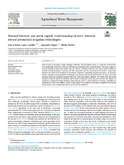Planned behavior and social capital: Understanding farmers’ behavior toward pressurized irrigation technologies.
Abstract
Water scarcity is becoming a major challenge worldwide. The agricultural sector, as a main user of freshwater, may significantly increase its water use efficiency by promoting water saving strategies. This paper proposes a socio-psychological model that builds upon the Theory of Planned Behavior and social capital variables to examine how psychological constructs and their interaction with the environment and farmers’ backgrounds influence the switch from traditional to pressurized irrigation. Considering temporal precedence, we measured farmers’ intention to adopt irrigation technologies, and one year later their actual behavior. We used a structural equation model and estimated marginal effects for direct and indirect relations. The results show that actual adoption is affected directly by intention, and the effect of subjective norms, perceived control, and attitudes on adoption are mediated through intention. Social pressure exerts a strong influence on farmers, particularly in comparison to their own attitudes. Social capital triggers the adoption of pressurized irrigation by increasing social pressure and strengthening farmers’ perceived self-confidence.
Keywords
Publisher
Elsevier, Ámsterdam (Países Bajos)
Is part of
Agricultural Water Management
URI (Permanet link to cite or share this item)
https://doi.org/10.1016/j.agwat.2020.106524https://repositorio.catie.ac.cr/handle/11554/9754


